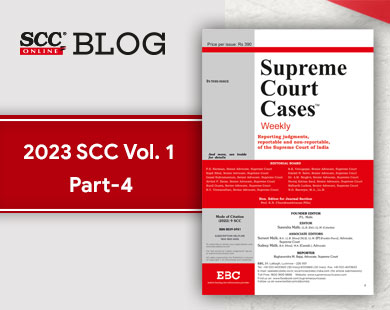Arbitration and Conciliation Act, 1996 — Ss. 20 and 42 r/w S. 2(1)(e) — Jurisdictional seat of arbitration once fixed under S. 20(2) by arbitrator — When changeable: Once the jurisdictional “seat” of arbitration is fixed in terms of S. 20(2), then, without the express mutual consent of the parties to the arbitration, “the seat” cannot be changed. Such consent must be express and clearly understood and agreed by the parties. “The seat” once fixed by the Arbitral Tribunal under S. 20(2), should remain static and fixed unless changed by express mutual consent of the parties, whereas the “venue” of arbitration can change and move from “the seat” to a new location. Venue is not constant and stationary and can move and change in terms of S. 20(3). Further, change of venue does not result in change or relocation of the “seat of arbitration”. [BBR (India) (P) Ltd. v. S.P. Singla Constructions (P) Ltd., (2023) 1 SCC 693]
Civil Procedure Code, 1908 — Or. 43 R. 1 and Or. 39 — Interlocutory orders which contain quality of finality — Quality of finality — Test for — Direct and immediate adverse effect on party concerned: Most of the interlocutory orders which contain the quality of finality are clearly specified in clauses (a) to (w) of Or. 43 R. 1 and would be “judgments” within the meaning of the letters patent and, therefore, appealable thereunder. However, there may be interlocutory orders which are not covered by Or. 43 R. 1 CPC but which also possess the characteristics and trappings of finality inasmuch as such orders may adversely affect a valuable right of the party or decide an important aspect of the trial in an ancillary proceeding. However, for such an order to be a “judgment”, an adverse effect on the party concerned must be direct and immediate rather than indirect or remote. [Shyam Sel & Power Ltd. v. Shyam Steel Industries Ltd., (2023) 1 SCC 634]
Insolvency and Bankruptcy Code, 2016 — Ss. 5(8) and 3(3) — “Financial debt” — Essential requirements of — “Disbursement” — Meaning of: Flow of money from debtor to creditor does not amount to disbursement. “Transaction” as defined under S. 3(33) is not applicable for construing the meaning of “disbursement”. [Noida v. Anand Sonbhadra, (2023) 1 SCC 724]
Penal Code, 1860 — Ss. 302/34 and 307/34: In this case, both accused-appellants herein (A-1 and A-3) and one co-accused A-2 (since dead) allegedly fired gunshots at deceased as well as at PW 6 (deceased victim’s family physician and private practitioner), when deceased was sitting in verandah outside his office at around 6.30 p.m., resulting in death of deceased in hospital on third day from incident date. It was held, there are glaring inconsistencies in evidence put forth by prosecution which cannot be ignored. It is clear that prosecution failed to recover bloodstained materials from place of occurrence, empty cartridges, pellets, or any other weapon used for commission of crime. Further, there are contradictions and unnatural conduct of eyewitnesses, and inconsistencies in two dying declarations given by deceased. Prosecution held, has clearly not proved case beyond reasonable doubt. Therefore, accused persons are entitled to be given benefit of doubt. Accordingly, judgments of courts below quashed and set aside. Hence, accused-appellants herein acquitted of all charges. [Munuwa v. State of U.P., (2023) 1 SCC 714]
Securitisation and Reconstruction of Financial Assets and Enforcement of Security Interest Act, 2002 — Ss. 14 and 17 — Possession of secured assets: Scope of jurisdiction of District Magistrate/Chief Metropolitan Magistrate under S. 14 and nature of powers exercised by DM/CMM under the section, determined. Principles clarified regarding proper remedy/forum for person aggrieved with action of secured creditor seeking to take possession of the secured assets or action of DM/CMM in respect thereof, such as tenant or lessee in possession of the secured asset(s). [Balkrishna Rama Tarle v. Phoenix ARC (P) Ltd., (2023) 1 SCC 662]
Securitisation and Reconstruction of Financial Assets and Enforcement of Security Interest Act, 2002 — S. 14 — Taking possession of secured assets: Expression “District Magistrate/Chief Metropolitan Magistrate” in S. 14, includes Additional District Magistrate/Additional Chief Metropolitan Magistrate. Further held, Additional Chief Metropolitan Magistrate cannot be said to be subordinate to the Chief Metropolitan Magistrate insofar as exercise of judicial powers is concerned. [R.D. Jain & Co. v. Capital First Ltd., (2023) 1 SCC 675]
Service Law — Pension — Arrears of pension — Entitlement — Nature of cause of action: Continuous cause of action to be determined. [M.L. Patil v. State of Goa, (2023) 1 SCC 660]






